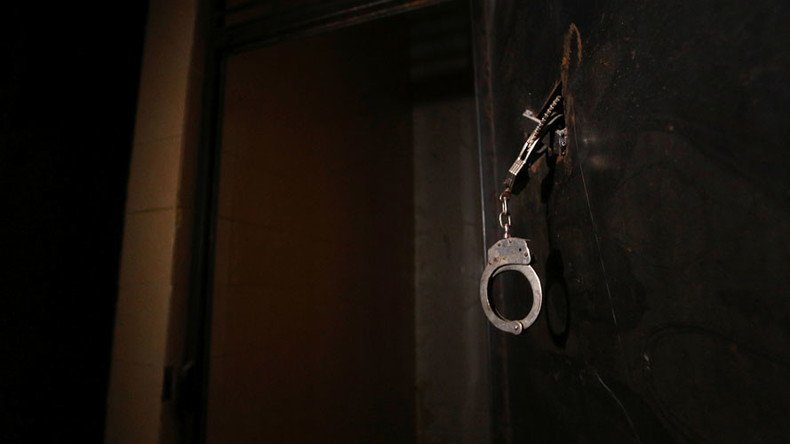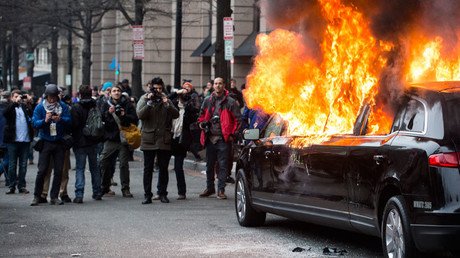‘Journalists in America facing ever-greater risks when covering riots’

The only way for media to report on public disturbances is to get involved, to go there and talk to people involved, and so on. That is now becoming riskier in the United States, historian Martin McCauley told RT.
A reporter for RT America, Alexander Rubinstein, is among six media workers charged with inciting a riot, the highest level offense under the District of Columbia’s public disturbances law.
The journalists, who were arrested at an anti-Trump protest on Inauguration day, are facing up to a decade behind bars.
The move has been condemned by the Organization for Security and Co-Operation in Europe [OSCE.]
RT: All of the detained media workers deny they were participating in the protests. Why do you think they were arrested in the first place?
Martin McCauley: President Trump said in his inauguration speech that he was pro-police; that he, in fact, would defend people against the police, against rioters who were causing trouble and so on. He regards the Obama era as one which is anti-police; where the police were afraid to go to certain areas, were afraid to arrest certain people, and so on. He’s turning that around. He said ‘we’re here to protect people’ and it is possible that District of Columbia police were told there will be riots, there will be trouble because the people who are demonstrating against Trump have in fact announced that.
Therefore you are to act vigorously; you can in fact arrest anyone whom you believe to be involved in rioting… They were seen as to be part of the group, part of those who were, in fact, doing damage, and so on. Police put the damage at $5,000, which isn’t very much; windows were broken, and so on.
The reporters were unfortunate – they were just swept up and included with the rioters because the police didn’t really take any word that they said. They didn’t believe them. They said their job was to arrest those whom they believed were involved in the riot. And there was no use for journalists saying: “No, we’re here, we’re reporters. This is our job,” and so on. The police ignored that, arrested them and put them behind bars.
RT: What do you make of the fact that one of the RT reporters, along with his colleagues, is charged with a felony, a criminal offense?
MM: Well, if you’re engaged in rioting under US law, then that is a criminal offense. The defense, the prosecuting council would have to show that you caused damage, or you incited a riot, or you were involved in rioting and caused damage. That would be very difficult to prove because the journalists were doing their job.
Therefore, you could see this in many ways as a way of intimidating journalists and warning them that during the Trump era they are not to become involved in any riot or something like that. If they become involved, they got mixed with rioters; then they may be arrested and put behind bars. Therefore they should keep their distance.
That is very difficult for freedom of the press. If there is a riot, a disturbance going on, it is the tactic of the media to cover it. The only way to do it is to get involved, to get go there and talk to people involved, and so on. That is now becoming more risky in the US. If the District of Columbia police were given the ‘OK’ to sweep up anyone who may believe to be involved in what they call the riot, this means that journalists throughout the US will have to be very careful about where they go and whom they talk to.
Protests and controversies make #Trump’s inauguration one of a kind https://t.co/o4sa3RYnLjpic.twitter.com/ble6upYB6C
— RT America (@RT_America) 19 января 2017 г.
‘Covering hooliganism doesn’t make you a hooligan’
Adam Garrie from The Duran news website said there is a difference between journalists reporting on hooliganism, and individuals taking part in criminal activities.
RT: So press freedom groups are describing the arrests and charges against journalists disturbing and outrageous, calling for all charges to be dropped. Do you think they will be dropped?
Adam Garrie: It is a difficult situation. The maximum sentence for felony rioting, which will be applied, is ten years. As a law and order man myself, I tend to think that such a maximum sentence veers toward the liberal side of things. What people seem to totally not understand is that there is a big difference between the kind of hooliganism that we saw on display – we saw violence against property, violence against individuals and the threats of both at a criminal level of intent - there is a difference between that and reportage, journalism.
Alexander, like the others arrested, was simply there covering things. Robert Capa, the great photographer from the Spanish Civil War, photographed fascist atrocities, but that didn’t make him a fascist – he was actually a lifelong anti-fascist. So the idea that covering hooliganistic events somehow makes you a hooligan, not only is it illogical, but the conclusion is totally immoral and justice ought to be served as soon as possible.
The statements, views and opinions expressed in this column are solely those of the author and do not necessarily represent those of RT.













